#21st-century Information Age economy
Text
Why Politics Has Become So Stressful
Why Politics Has Become So Stressful
No matter which party wins control of the House and Senate next month, the results are virtually certain to reinforce the paradox powering the nation’s steadily mounting political tension.
American politics today may be both more rigid and more unstable than at any other time since at least the Civil War. A politics that is rigid and unstable sounds like a contradiction in terms. But the system’s…
View On WordPress
#21st-century Information Age economy#American history#balance of power#best evidence#coastal states#consecutive elections#control of Congress#control of the chamber#control of the House#Democrats#demographic change#Donald Trump#dozen states#dream of occasional statewide wins#federal government#fifth consecutive time#first extended period of political instability#FiveThirtyEight election-outcome probabilities#gubernatorial win#handful of states#highly competitive Senate races#joe biden#last presidential election#list of genuine swing states#longest period#modern American politics#modern Democratic electoral coalition#momentary mood swing#next month#outcome of elections teeters
0 notes
Text
Franchesca U. Pajarillaga
Eloisa A. Pasion
Paul Tibbet E. Uera
“Mastering the Language of Connection: The Key of Effective Communication”
The most powerful weapon in the process of ways on how to communicate for each and individual to understand every language. It is a best action transfer of information from one person to another by writing and speaking. Communication is an integral part of human existence and plays crucial role in our personal, social, and professional lives. It serves as the foundation for building relationships, expressing thoughts and ideas, resolving conflicts, sharing knowledge, fostering collaboration and promoting personal growth.
In today’s generation, technology has transformed the way we communicate. Social media and video call have made it easier than ever to connect with people. However, it is important to ensuring that we prioritize genuine connection. Effective communication allows us to express our thoughts, ideas, and emotions to others. We can convey our opinion, share experiences, and engage in meaningful conversations. Whether it is expressing joy, sadness, or frustration, communication provides us with a platform to articulate our innermost feelings, enabling others to understand and empathize with us. It enables us to learn from others, and expand our understanding of the world. In the 21st century has amplified the voices of individuals and communities, enabling them to advocate for social change and address pressing issues. Social media platforms have become powerful tools for, allowing marginalized groups to share their stories, mobilize support, and challenge societal norms. Effective communication facilitates grassroots movements, raises awareness, and empowers individuals to drive positive change in their communities and beyond. It essential enables team members to coordinate their efforts, share ideas, delegate tasks, and work towards common goals. Clear and open communication fosters synergy, creativity, and innovation within a team, leading to increased productivity and success. By actively listening and effectively communicating, individuals can contribute their unique perspectives and skills, promoting a collaborative and inclusive work environment communication is of utmost importance in our lives. It serves as a powerful tool for expressing thoughts and ideas, building relationships, resolving conflicts, sharing knowledge, fostering collaboration, and promoting personal and professional growth. By honing our communication skills and embracing open and honest dialogue, we can enhance our connections with others, navigate challenges, and achieve success in various aspects of life. Communication is not merely a means of conveying information; it is the lifeblood that sustains human interaction and enables us to thrive as individuals and as a society.
Its impact in everyday life have made it easier to disseminate knowledge, ideas, and discoveries to a wider audience. Though online platforms, blogs podcast, and social media, individuals can share their expertise, contribute to intellectual discourse, and expand the collective knowledge of society. The digital age has revolutionized the way we access and share information. Communication in the 21st century has democratized information. Empowering individuals to become lifelong learners and active participants in the global knowledge economy. It empowers us to educate, inspire, and influence others fostering intellectual growth and progress. If your communication skills are admirable, people will love and give you respect. Hence you can say that communications skills can make a big change to your reputation in society. Through communication, anyone can find solutions to even serious problems. When we talk, we get ideas from people that aid us to solve the issues. Powerful communication is the strength of any organization and can help it in many ways. Communication is the greatest importance. It is important to sharing out one’s thoughts and feelings to live a fuller and happier life.
1 note
·
View note
Text
Navigating the Behemoths of Construction: The World of Heavy Engineering Equipment
In the colossal world of construction and infrastructure development, heavy engineering equipment stands as the backbone, enabling humanity to sculpt the natural and urban landscapes of our planet. These mechanical giants, ranging from towering cranes to earth-shaking bulldozers, are not just tools but symbols of human ingenuity and the relentless pursuit of progress. This article delves into the realm of heavy engineering equipment, exploring its vital role, the technological marvels it encompasses, and the future trajectory of this dynamic industry.
The Titans of Construction
These machines are designed for tasks that require immense power, precision, and durability. The spectrum of equipment includes, but is not limited to, cranes, bulldozers, excavators, dump trucks, and concrete mixers. Each piece of equipment is engineered to perform specific tasks, from excavation and material handling to heavy lifting and beyond, proving indispensable to the infrastructure that underpins modern civilization.
Engineering Marvels of the Modern Age
The design and manufacturing of heavy engineering equipment are feats of modern engineering. For instance, cranes, which can reach heights towering over the tallest skyscrapers, are designed with meticulous attention to balance and stability, allowing them to lift loads of several tons with astonishing precision. Similarly, excavators, with their hydraulic arms capable of tearing through solid earth, embody the incredible advances in hydraulic technology and materials science.
Innovations such as GPS-guided machinery and automated control systems have further enhanced the capabilities of these machines, allowing for greater efficiency and safety. The integration of information technology has led to the advent of "smart" equipment, capable of diagnosing its own maintenance needs and optimizing its operation for maximum productivity.
The Backbone of Global Development
Heavy engineering equipment plays a pivotal role in projects that are essential for societal advancement and economic growth. These machines are at the heart of constructing infrastructure such as roads, bridges, airports, and dams. Furthermore, they are critical in the mining and energy sectors, enabling the extraction and processing of the natural resources that fuel the global economy.
The importance of heavy engineering equipment extends beyond construction and industrial applications; it is also crucial in disaster response and recovery operations. Following natural disasters such as earthquakes and hurricanes, heavy machinery is deployed for rescue operations, clearing debris, and reconstructing damaged infrastructure.
The Road Ahead: Sustainability and Innovation
The future of heavy engineering equipment is poised on the cusp of revolutionary changes, driven by the imperatives of sustainability and technological innovation. The industry is moving towards the development of more environmentally friendly machines, including electric and hybrid models, to reduce the carbon footprint of construction and mining operations. Autonomous machinery, equipped with AI and machine learning, promises to transform the landscape of construction by improving safety, efficiency, and precision.
Moreover, the integration of advanced materials and 3D printing technology is set to redefine the manufacturing of heavy equipment, making it lighter, stronger, and more cost-effective. These innovations not only promise to enhance the performance and efficiency of heavy machinery but also align the industry with the global push towards sustainable development and green technologies.
Conclusion
Heavy engineering equipment stands as a testament to human ingenuity, a critical enabler of the infrastructure that shapes our world. As the industry evolves, the continued innovation and adaptation of this equipment will be vital in addressing the challenges of the 21st century, from urbanization and resource scarcity to climate change. In the hands of skilled operators and guided by the principles of sustainability and technological advancement, these mechanical giants will continue to play a central role in building the future of humanity.
0 notes
Text
Lifelong Learning and Skill Development: Navigating the Path to Personal and Professional Growth

In today's fast-paced and ever-evolving world, lifelong learning and skill development have become a cornerstone of personal fulfillment and professional success. As we navigate the complexities of the 21st century, the traditional education model, which often ends with formal schooling, is transcended by a continuous, self-directed learning journey. This article explores the growing emphasis on lifelong learning and how online courses, workshops, and webinars are pivotal in acquiring new skills, boosting career prospects, and fostering personal growth.
The Rise of Lifelong Learning
Lifelong learning refers to the ongoing, voluntary, and self-motivated pursuit of knowledge for personal or professional reasons. It extends beyond the classroom to encompass broader informal and formal learning opportunities. The digital age has democratized access to information, making it possible for individuals to learn anything, anywhere, and at any time. This accessibility has led to the popularity of online learning platforms that offer courses in everything from blockchain technology to art history.
Skill Development in the Digital Era
The rapid pace of technological advancement means that the skills required in the job market constantly evolve. As a result, individuals must continually update their skills to remain competitive. Online courses, workshops, and webinars provide an effective and flexible way to achieve this. They allow learners to tailor their education to their specific needs and schedules, making it possible to balance work, life, and education.
Boosting Career Prospects
In a job market that increasingly values versatility and adaptability, lifelong learning is becoming a key differentiator for job seekers and professionals. Employers are not only looking for academic qualifications but also for evidence of continuous learning and skill development. Engaging in lifelong learning initiatives demonstrates a proactive attitude, a commitment to self-improvement, and the ability to adapt to change—all highly valued in the modern workplace.
Fostering Personal Growth
Beyond the professional realm, lifelong learning has profound implications for personal development. It can lead to improved self-esteem, enhanced life satisfaction, and a broader perspective on the world. Learning new skills can ignite a passion for new hobbies, lead to new social connections, and promote better mental health.
Challenges and Opportunities
While the benefits of lifelong learning are clear, there are challenges to consider. Access to technology, the digital divide, and the need for self-motivation can all hinder effective online learning. However, these challenges also present opportunities for innovation in educational technology and learning methodologies.
The Future of Learning
As we look to the future, the trend toward lifelong learning and skill development will likely continue, driven by technological advancements and the dynamic nature of the global economy. Educational institutions, businesses, and individuals must adapt to this changing landscape, where learning is an ongoing process, and education is a lifelong journey.
In conclusion, the shift towards lifelong learning and skill development reflects a broader change in our approach to education and work. In an age of information abundance, the ability to continuously acquire and apply new knowledge and skills is crucial for both personal fulfillment and professional success. As we embrace this paradigm, we unlock the potential for a more dynamic, innovative, and fulfilling future.
Read the full article
0 notes
Text
Alredered is Celebrating Read Across America Day To-day.
MARCH 01, 2024
A Proclamation on Read Across America Day, 2024
HOME
BRIEFING ROOM
PRESIDENTIAL ACTIONS
I have always believed that America’s children are the kite strings that keep our national ambitions aloft — the more we do today to spark their curiosity, their confidence, and their imaginations, the stronger our country will be tomorrow. The key to developing young learners into engaged, active, and innovative thinkers is instilling in them a love of reading at an early age. Reading is the gateway to countless skills and possibilities — it sets children on the path to a lifetime of discovery. On this Read Across America Day, we celebrate the parents, educators, librarians, and other champions of reading who help launch our Nation’s children on that critical path.
Once a passion for reading takes hold in a young person, the benefits extend far beyond the classroom. Reading broadens our perspective, introduces us to new worlds, cultures, and languages, and cultivates our sense of empathy and understanding of other people’s experiences and views. Reading informs us, empowers us, and teaches us the lessons of history. It helps us make sense of the world as it is — and inspires us to dream of what it could be. Studies also show that reading improves our memory, helps us become better problem solvers, and even reduces the chance of developing cognitive disorders such as Alzheimer’s down the road. And with the right book in hand, reading can nourish not only our minds, but our souls.
The First Lady often observes that “any nation that out-educates us will out-compete us.” She is absolutely correct. Literacy is essential to finding a good-paying job, advancing in your career, and carving out your place in the middle class. Reading proficiency is what makes us a Nation of innovators and entrepreneurs — a Nation capable of building and growing a dynamic 21st century economy. Reading comprehension is also what allows us to discern fact from fiction — a critical skill at all times, and especially so in the midst of a global pandemic, when the health and safety of our loved ones could very well depend on determining the veracity of what we read.
According to Department of Education estimates, more than half of United States adults (54 percent) between 16- and 74-years of age lack proficiency in literacy, reading below the equivalent of a sixth-grade level. Illiteracy incurs a massive economic toll on our economy, and keeps not just individuals, but our entire Nation, from reaching our full potential. By every calculation, reading matters to our shared quality of life.
For countless Americans, the path to literacy begins with story time in their school classroom. That is one of many reasons why my Administration is providing support to States and communities to help them create the conditions for students to return to safe, in-person learning as quickly as possible. We must ensure that all of our children receive the high-quality instruction and essential classroom time they need to learn and grow. It is a national imperative that we minimize the learning loss caused by the pandemic — and address the disproportionate impact that lost time imposes on our most vulnerable students and families.
NOW, THEREFORE, I, JOSEPH R. BIDEN JR., President of the United States of America, by virtue of the authority vested in me by the Constitution and the laws of the United States, do hereby proclaim March 2, 2021, as Read Across America Day. I call upon children, families, educators, librarians, public officials, and all the people of the United States to observe this day with appropriate programs, ceremonies, and activities.
IN WITNESS WHEREOF, I have hereunto set my hand this first day of March, in the year of our Lord two thousand twenty-one, and of the Independence of the United States of America the two hundred and forty-fifth.
JOSEPH R. BIDEN JR.
0 notes
Text
The Importance of Reliable Data Connections in the Digital Age

An essential part of our everyday life in the digital era is having smooth access to and transmission of data. Reliable data connections are essential to everyday life in the current day, whether they are used for communication, education, entertainment, or business. It is impossible to overestimate the importance of having a consistent data connection because it supports many facets of our society, including business, education, healthcare, and social contact.
Facilitating smooth communication is one of the most urgent and important roles those dependable data connections play. People rely on data connections for all forms of communication, including phone and video conversations, email, instant messaging, and more. Data connections span geographic gaps and enable efficient communication, whether it's interacting with family and friends around the world or working in real time with coworkers.
The widespread adoption of online learning and distant employment has further underlined the need for dependable data connectivity. Data connections are essential for professionals who work remotely to access corporate resources, participate in virtual meetings, and communicate with their teams. Like this, students need strong data connections to take part in online courses, access course materials, and work with peers. The requirement for reliability is highlighted by the fact that a poor or unstable data connection can interfere with learning and productivity.
A network of linked gadgets, sensors, and things that interact and share data is known as the Internet of Things (IoT). These gadgets, which vary from self-driving cars to smart thermostats, depend on internet connectivity to operate well. IoT devices in the healthcare industry have the potential to save lives by instantly transmitting important patient data to healthcare practitioners. IoT technology may improve public services and optimize energy use in smart cities. The IoT is made possible by these advancements, which are based on dependable data connectivity.
Digital services and e-commerce have assimilated into the modern economy. Platforms for digital entertainment, digital banking, and online commerce all depend on reliable data connections. A flawless data connection guarantees fast and safe online transactions in e-commerce. Strong data connections are needed for streaming services to offer uninterrupted high-quality content. The success of digital enterprises may be impacted by the stability of data connections, which has a direct influence on the user experience.
The emergence of telemedicine has caused a revolution in the healthcare industry. Remote consultations with healthcare professionals might help patients avoid in-person appointments. This transformation, however, depends on reliable data links. Access to patient information, video consultations, and safe transmission of medical pictures and data are all necessities for healthcare providers. A dependable data connection can make the difference between life and death in emergency scenarios.
The digital divide is still a problem even if dependable data connections are now required. Some places and people continue to be underserved due to disparities in access to high-speed internet and data services. To ensure that everyone can make use of the potential and benefits of dependable data connections, this digital gap must be closed.
In conclusion, it is impossible to exaggerate the significance of dependable data connections in the digital age. They support the IoT, drive e-commerce and digital services, underlying communication, enable remote work and education, and improve healthcare. As we continue to traverse the 21st century's digital world, it is not only a technological challenge but also a societal necessity to ensure that these connections remain reliable and accessible for everyone.
Visit our website https://www.unlimitedsimplans.com/.
0 notes
Text
Empowering South India's Digital Future: Sify Technologies' Data Centers in Chennai
Chennai, often referred to as the ‘Gateway of South India,’ is a bustling hub of commerce, culture, and technology. This vibrant metropolis, with its rich history, has seen a remarkable transformation into a modern digital economy. At the heart of this transformation is Sify Technologies, a pioneer in providing cutting-edge data center solutions. Let’s explore how Sify’s data centers in Chennai are playing a pivotal role in shaping the digital landscape of this region.
A Digital Hub in South India
Chennai, as a key business and technology center in South India, is witnessing a surge in data-driven activities. Enterprises, from startups to large corporations, are relying on data-intensive applications, cloud computing, and digital services to drive their businesses forward. In this context, the need for robust, secure, and highly available data centers is paramount.
Sify’s Data Center Solutions
Sify Technologies has been at the forefront of offering data center services that cater to the specific demands of the digital age. Their state-of-the-art data centers in Chennai are not just facilities but technology hubs designed to empower businesses to thrive in a data-driven world.
**1. Proximity to Businesses:
Sify’s data centers are strategically located in close proximity to Chennai’s major business districts. This ensures low-latency, high-speed connectivity for businesses in the city, enabling them to efficiently access and manage their mission-critical data.
**2. Scalability:
Sify’s Chennai data centers are built to be scalable, accommodating the evolving needs of businesses. Whether you’re a startup looking for initial server space or a large corporation in need of a private cloud solution, Sify’s data centers can be tailored to your requirements.
**3. Robust Security:
Data security is non-negotiable in today’s digital landscape. Sify’s data centers are equipped with advanced security measures, including biometric access control, surveillance, and fire protection systems. This ensures the safety and confidentiality of your data.
**4. Business Continuity:
Unforeseen events can disrupt business operations. Sify’s data centers in Chennai are designed to ensure business continuity, with redundant power supplies and backup systems. Even during a power outage or natural disaster, your data remains accessible.
**5. Managed Services:
Sify doesn’t just provide the infrastructure; they offer a range of managed services, including colocation, cloud hosting, and disaster recovery. This means your IT team can focus on core business operations, while Sify manages the technical aspects.
**6. Compliance and Certifications:
Sify’s Chennai data centers comply with international standards for data security and quality management. They hold certifications such as ISO 27001 and ISO 9001, giving businesses confidence in their reliability.
The Sify Advantage
Sify Technologies is more than a data center provider; it’s a strategic partner in your digital journey. By choosing Sify, businesses in Chennai gain access to a powerful ecosystem that includes reliable data infrastructure, expert support, and the ability to scale according to business needs.
The digital age demands data centers that are not just repositories of information but dynamic hubs that drive innovation and growth. Sify Technologies’ data centers in Chennai are an essential pillar of the city’s digital transformation, enabling businesses to leverage the power of data to succeed in the 21st century. Sify’s commitment to innovation, security, and excellence makes it the preferred choice for businesses looking to thrive in Chennai’s fast-paced digital landscape.
0 notes
Text
What is Stem?
STEM, an acronym for Science, Technology, Engineering, and Mathematics, represents a multidisciplinary approach to education and problem-solving. These fields are the driving forces behind technological advancements, and scientific discoveries in the modern world. Science involves the systematic study of the natural world, seeking to understand its underlying principles and laws. Technology encompasses the application of scientific knowledge to develop tools, systems, and processes that make our lives more efficient and comfortable. Engineering is the practice of designing and creating solutions to real-world problems, while mathematics serves as the universal language and foundation for all STEM disciplines, providing the essential analytical and quantitative skills.
STEM education is recognized as a cornerstone for preparing students for success in the 21st century. It fosters critical thinking, problem-solving, and analytical skills, which are not only valuable in STEM careers but also highly sought after in a broad spectrum of industries. Moreover, STEM fields play a crucial role in addressing global challenges, such as climate change, healthcare, and cybersecurity. They are at the forefront of finding solutions to these complex issues. The demand for STEM professionals is consistently growing, with diverse career opportunities in fields like computer science, biotechnology, aerospace engineering, and data analysis. Encouraging STEM education and fostering interest in these subjects is essential for building a capable and informed workforce that can drive innovation and address the world's most pressing problems.
STEM education is not limited to formal classrooms but extends to informal learning environments, extracurricular activities, and online resources. It's important to engage students from a young age to spark their interest and curiosity in STEM subjects. Additionally, promoting diversity and inclusion in STEM is crucial to ensure that a wide range of perspectives and talents contribute to scientific progress and innovation. Governments, educational institutions, and industry leaders are increasingly recognizing the importance of investing in STEM education and research to maintain competitiveness in the global economy and meet the evolving challenges of the future.
STEM is the foundation of progress in the modern world, driving innovation, economic growth, and scientific discovery. STEM education equips individuals with the skills needed to navigate an increasingly complex and technology-driven society. By fostering an interest in STEM from an early age and promoting diversity in these fields, we can ensure a brighter future, where STEM professionals play a pivotal role in shaping our world for the better.
1 note
·
View note
Text
Nurturing Connectivity: The Backbone of Our Modern World
In today's rapidly evolving world, the term "connectivity" has taken on a whole new meaning. No longer confined to just the physical connections between people or places, connectivity has expanded to encompass the intricate web of relationships between devices, systems, and even ideas. It's a concept that transcends boundaries, cultures, and technologies, underpinning the way we live, work, and interact with the world around us. In this blog, we'll explore the multifaceted nature of connectivity and its profound impact on our lives.

Here's my email:[email protected]
The Evolution of Connectivity
Connectivity has come a long way from the days when it simply referred to physical transportation and communication. Historically, humans have always sought to bridge distances and bring people closer together. The invention of the wheel, the construction of roads, and the development of written language were all pivotal moments in the evolution of connectivity.
Fast forward to the 21st century, and we find ourselves in an era where digital connectivity reigns supreme. The advent of the internet and the proliferation of smartphones have revolutionized the way we connect. Now, we can communicate instantaneously with anyone, anywhere in the world. This unprecedented level of global connectivity has transformed industries, cultures, and societies.
The Pillars of Modern Connectivity
Modern connectivity rests on several key pillars:
Digital Infrastructure: The backbone of connectivity in the digital age is the vast network of fiber optic cables, satellites, and wireless towers that enable data to flow seamlessly across the globe. These physical networks connect us to the internet and, by extension, to each other.
Internet of Things (IoT): The IoT is the interconnected web of smart devices, from thermostats and refrigerators to cars and industrial machinery. These devices gather data and communicate with each other to make our lives more convenient and efficient.
Social Connectivity: Social media platforms have transformed how we build and maintain relationships. They enable us to connect with friends, family, and even strangers on a global scale, sharing ideas, experiences, and information.
Business and Economic Connectivity: Globalization has interconnected economies and businesses, creating a truly global marketplace. Companies can now operate on a worldwide scale, reaching customers and partners in distant corners of the planet.
Cultural Connectivity: The internet has facilitated the exchange of cultures and ideas, allowing people to engage with diverse perspectives and experiences. This cultural exchange has enriched our lives and broadened our horizons.
The Impact of Connectivity
Connectivity has had a profound impact on almost every aspect of our lives:
Communication: We can communicate instantly with anyone, regardless of their location. This has transformed how we stay in touch with loved ones, collaborate with colleagues, and share information.
Education: Online learning has made education accessible to people around the world, breaking down barriers to knowledge and skills.
Healthcare: Telemedicine and connected medical devices have revolutionized healthcare, enabling remote consultations and real-time monitoring of patients.
Economy: Global connectivity has opened up new markets for businesses and fueled economic growth. E-commerce has transformed the way we shop, allowing us to buy products from anywhere in the world.
Sustainability: Connectivity plays a crucial role in addressing environmental challenges. Smart grids, for example, enable more efficient energy distribution, reducing waste and emissions.
Social Movements: Connectivity has been instrumental in mobilizing social movements and raising awareness about important issues. It allows people to come together, share their stories, and advocate for change.
Challenges and Considerations
While connectivity offers immense benefits, it also presents challenges and considerations:
Privacy and Security: With increased connectivity comes the risk of data breaches and invasions of privacy. Safeguarding personal information and digital assets is a growing concern.
Digital Divide: Not everyone has equal access to the benefits of connectivity. Bridging the digital divide is essential to ensure that all individuals and communities can participate in the digital age.
Environmental Impact: The infrastructure that supports connectivity can have a significant environmental footprint. Sustainable practices are crucial to mitigate these effects.
Conclusion
Connectivity is the lifeblood of our modern world, connecting people, devices, and ideas in unprecedented ways. It has transformed the way we live, work, and interact with the world. Embracing the opportunities and addressing the challenges of connectivity is essential as we navigate the ever-evolving landscape of the digital age. It's a force that has the potential to shape a more connected, informed, and inclusive future for all of us.
0 notes
Text
A Millennial's Guide to Finance Management
The age of avocado toast, digital revolutions, and societal redefinitions. Being a millennial means navigating a world vastly different from that of previous generations. With economic challenges and opportunities that are unique to the 21st century, managing finances as a millennial requires a tailored approach. This guide dives into the ins and outs of finance management for the digital age's trailblazers.
1. Introduction: Understanding the Millennial Financial Landscape
Shaped by the rise of the internet, the 2008 financial crisis, and a shift in societal values, millennials face both hurdles and advantages in financial management. From student loans to cryptocurrency, it's a brave new world.
2. Tackling the Student Loan Dilemma
Understanding Your Loan: Know your interest rates, terms, and repayment options.
Refinancing Options: Consider consolidating or refinancing for better rates.
Balancing Act: Don't forgo savings or investments entirely to pay off loans quickly.
3. Embracing Technology in Personal Finance
a. Budgeting Apps: Tools like Mint or YNAB that automatically categorize and track expenses. b. Investment Platforms: Apps like Robinhood or Acorns that democratize investing.
4. Setting Clear Financial Goals
Short-Term Goals: Saving for vacations, emergency funds, or buying a new gadget.
Long-Term Goals: Homeownership, retirement, or starting a business.
5. The Importance of an Emergency Fund
A cushion of 3-6 months' expenses can safeguard against unexpected job losses, medical emergencies, or urgent car repairs.
6. Investing for the Future, Today
a. Start Small: Embrace micro-investing platforms. b. Understand the Market: Educate yourself before delving into stocks or crypto. c. Retirement Accounts: Don't underestimate the power of 401(k) or IRA contributions.
7. Navigating the Housing Market
Renting vs. Buying: Understand the pros and cons. Sometimes renting makes more financial sense.
House Hacking: Renting out a part of your property can offset mortgage costs.
8. Being Credit Savvy
a. Importance of a Good Credit Score: It affects loan approvals, interest rates, and even job applications. b. Monitoring and Building: Use credit responsibly and monitor through free services like Credit Karma.
9. The Gig Economy and Side Hustles
Harness the digital age:
Freelance Platforms: Websites like Upwork or Fiverr offer myriad opportunities.
Sharing Economy: From Airbnb to Uber, there are many ways to earn.
10. Traveling Smart: Seeing the World on a Budget
a. Travel Hacking: Leverage credit card points and frequent flyer programs. b. Budget Travel: Explore off-the-beaten-path destinations or travel during off-peak times.
11. Decoding Insurance: Health, Auto, and Beyond
Understanding the importance of being insured and how to find the best deals without compromising on coverage.
12. Sustainable and Ethical Finance
a. Green Investing: Put your money where your values are. b. Supporting Ethical Companies: Be it through investments or purchases, support businesses that align with your values.
13. Continual Financial Education
Podcasts and Blogs: Stay updated with changing financial landscapes.
Books: Classics like "Rich Dad Poor Dad" offer timeless advice.
14. Planning for Major Life Events
a. Weddings: Budgeting for the big day without breaking the bank. b. Children: Understanding the financial implications of expanding your family.
15. Avoiding Common Financial Pitfalls
a. Impulse Purchases: The allure of online shopping deals can add up. b. Being Under-insured: Skimping on insurance can lead to huge bills later. c. Not Reviewing Financial Statements: Regularly review bank and credit card statements for mistakes or fraud.
Conclusion
While the financial journey of a millennial may be peppered with challenges, it is also ripe with opportunities. By leveraging technology, staying informed, and making strategic decisions, millennials can pave a path of financial stability and success. This era, with its blend of traditional financial principles and new-age opportunities, offers myriad avenues to thrive. Remember, it's not about how much you earn, but how wisely you manage, save, and invest.
#finance#finance assignment help#finance management#finance news#finance stock#finance guide#finance & law
0 notes
Text
Diverse Interests and Niches: Modern society is characterized by a wide range of interests and hobbies. Magazines cater to specific niches and passions, allowing readers to find content tailored to their individual tastes, whether it's about fashion, sports, technology, travel, cooking, or countless other subjects.
Consumer Demand for Specialized Content: In an age of information overload, readers seek specialized and curated content. Magazines provide in-depth coverage and analysis on specific topics, helping readers navigate complex subjects.
Globalization and Cultural Diversity: The interconnected world has created an appetite for magazines that explore global cultures, cuisines, and lifestyles. Readers are interested in learning about and experiencing diverse perspectives.
Passion Economy: The digital age has given rise to the passion economy, where individuals can monetize their expertise and passions. This has led to the creation of niche content that caters to specific enthusiast communities.
Diverse Interests: As society becomes more diverse and multicultural, people's interests and tastes naturally become more varied. Magazines that cater to specific cultural or subcultural interests have gained traction.
As a result, individuals are increasingly seeking content that aligns with their specific interests and needs + This has conditioned people to expect content that caters to their unique preferences. + Increased exposure to global cultures and trends has expanded people's horizons and introduced them to a wider array of interests and tastes. As a result, they may seek out content that reflects these diverse influences. The digital age has given rise to the passion economy, where individuals can monetize their expertise and passions. This has led to the creation of niche content that caters to specific enthusiast communities. When do you think the personal taste has been boomed
social media platforms in the 21st century has enabled people to connect with like-minded individuals and discover content that caters to their unique preferences. Social media algorithms and recommendation systems often reinforce this trend by suggesting content based on users' past interactions and interests. Online marketplaces, such as Amazon and Etsy, have facilitated the growth of niche markets and the sale of specialized products
Cultural Globalization: Increased exposure to global cultures and trends, facilitated by travel, migration, and digital media, has broadened people's horizons and led to a greater appreciation for diverse interests and tastes.
Emotional Connection: Consuming content that resonates with one's personal tastes and interests often leads to a stronger emotional connection with that content. This emotional engagement can serve as a positive distraction from anxious thoughts and feelings.
Stress Reduction: Engaging with content that genuinely interests and engages an individual can be a form of stress reduction. It allows them to temporarily shift their focus away from sources of stress and anxiety, providing a mental break.
Validation and Affirmation: Personalized content that aligns with an individual's values and beliefs can offer validation and affirmation of their identity and worldview. This validation can boost self-esteem and reduce anxiety related to self-doubt or social judgment.
Stimulation and Engagement: Content tailored to an individual's preferences tends to be more engaging. It stimulates the mind and provides intellectual or creative satisfaction, which can be a form of mental relaxation and stress relief.
Enhanced Coping Mechanism: Personalized content can serve as a healthy coping mechanism for managing anxiety. It provides an alternative way to channel one's thoughts and emotions, especially during challenging times.
Diverse Media Content: The digital age has given rise to a vast array of media content, including books, movies, TV shows, music, podcasts, and online articles, each catering to a wide range of genres, themes, and niches. This abundance allows people to explore and develop new interests.
Globalization: Exposure to different cultures, traditions, and cuisines from around the world has broadened people's horizons and introduced them to diverse interests and preferences. Globalization has made it easier to access and appreciate a wide variety of cultural influences.
Online Communities: The internet has facilitated the formation of online communities and forums dedicated to countless topics and hobbies. People can connect with others who share their specific interests, further encouraging exploration and enthusiasm.
Content Personalization: Online platforms and recommendation algorithms tailor content to individual preferences, helping users discover new interests and explore related topics.
Education and Learning: Online courses, tutorials, and educational resources have made it easier for individuals to acquire new skills and knowledge in areas of interest, fostering the development of new passions.
DIY and Maker Culture: DIY (Do It Yourself) and maker culture have encouraged people to pursue hands-on hobbies and craft their own creations, from woodworking to electronics to homemade foods and beverages.
Cultural and Subcultural Movements: Social and cultural movements, such as sustainability, wellness, and minimalism, have inspired individuals to adopt new lifestyles and interests related to these movements.
Specialized Industries: As industries have become more specialized, people have found opportunities to explore unique interests, such as artisanal food production, niche fashion design, or collectible hobbies like vintage toy collecting.
Entrepreneurship: The ability for individuals to start their own businesses and ventures has led to the creation of niche products and services tailored to specific interests and markets.
Access to Information: The ease of access to information and resources on the internet allows people to research and delve into various subjects, from niche historical topics to esoteric hobbies.
Travel and Exploration: Increased travel opportunities have enabled people to experience different cultures and environments, leading to the development of new interests related to travel and exploration.
Cultural Experiences: Access to cultural events, such as music festivals, art exhibitions, and food festivals, has exposed individuals to a wider range of cultural experiences and tastes.
It's true that individuals can become deeply engrossed in their personal tastes, interests, and hobbies, to the point where they may allocate a significant amount of time and attention to these pursuits. This level of passion and dedication to one's interests can be enriching and fulfilling. However, it's important to strike a balance in life and not lose sight of the value of personal relationships, including romantic love and connections with others.
0 notes
Text
21st century skills
21st century skills refer to a set of abilities and competencies that are considered essential for success in the modern world. These skills are often associated with the demands of the digital age and the rapidly changing global economy. Some common 21st century skills include:
1.Critical thinking and problem-solving: The ability to analyze information, evaluate different perspectives, and come…
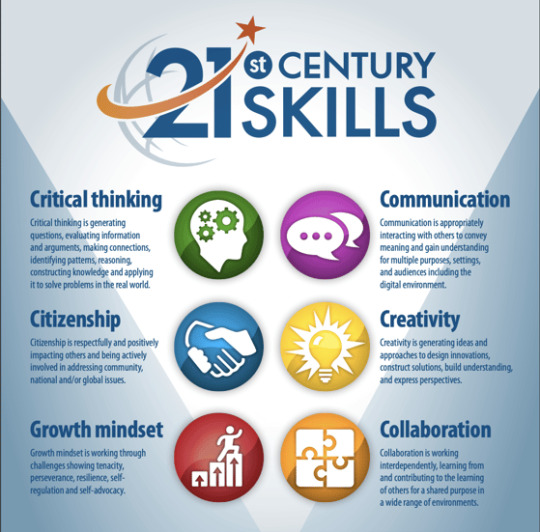
View On WordPress
0 notes
Text
Internet as a Utility: Digital Equality & What You Need to Know
In the 21st century, the internet has transformed from a luxury into an essential tool that permeates every facet of modern life. Its influence spans education, communication, commerce, healthcare, and even civic engagement. Given its unparalleled significance, a compelling case can be made for treating the internet as a utility. Which in this context, is a vital resource that should be universally accessible, affordable, and governed by principles of equity and inclusivity. Much like electricity, water, and transportation, the internet has become an indispensable infrastructure that underpins a functional and progressive society.
In this digital age, where connectivity is synonymous with opportunity, considering the internet as a utility is not only a matter of technological convenience, but a fundamental step toward fostering a fair, connected, and empowered global community. Let's explore the compelling reasons why such a transformation is not only relevant but imperative for the well-being and advancement of individuals and societies alike.
Reasons to Treat Internet as a Utility
Treating the internet as a utility holds immense potential to shape a more equitable and prosperous digital landscape. Here are several compelling reasons that underscore the necessity of this approach:
Universal Access to Information
Just as electricity and water are considered basic necessities, the internet has become an essential tool for accessing information, education, and knowledge. Treating it as a utility ensures that all individuals, regardless of their socioeconomic status, have equal access to vital information. Which promotes informed decision-making and empowering marginalized communities.
Digital Inclusion
The internet as a utility addresses the digital divide, ensuring that underserved and remote areas have reliable and affordable access. This levels the playing field by granting everyone the opportunity to participate in the digital economy, access online services, and engage in online education. Which ultimately fosters social and economic inclusion.
Promoting Innovation and Entrepreneurship
By treating the internet as a utility, barriers to entry for startups and entrepreneurs are lowered. This democratizes innovation and creates a fertile ground for new businesses to thrive. Then driving economic growth and job creation. While also preventing monopolistic control over online access.
Net Neutrality and Fair Competition
Designating the internet as a public utility can enshrine principles of net neutrality. Helping to ensure that all online content is treated equally. This prevents internet service providers from throttling or prioritizing certain websites. While fostering fair competition and preserving an open digital marketplace.
Resilient Infrastructure with Internet as a Utility
Treating the internet as a utility encourages investments in robust and widespread infrastructure. This can lead to improved network reliability, higher data speeds, and expanded coverage. Furthermore, benefiting both urban and rural areas and reducing vulnerabilities during times of crisis.
Protecting Privacy and Digital Rights
As a utility, the internet can be subject to stronger regulations that safeguard user privacy and digital rights. This can include transparent data protection measures. It can also help ensure that personal information remains secure and private in an increasingly connected world.
Disaster Preparedness and Response
Recognizing the internet as a utility can enhance disaster preparedness and response capabilities. Reliable and widespread connectivity facilitates real-time communication and coordination during emergencies. Additionally, helping to potentially save lives and minimize damage.
Long-Term Economic and Social Benefits
Treating the internet as a public utility fosters a future-oriented perspective, emphasizing the long-term benefits of widespread access. A well-connected populace can drive innovation, research, and education. Certainly paving the way for advancements in various sectors that benefit society as a whole.
In conclusion, treating the internet as a public utility is more than a matter of convenience. It is a fundamental step toward building an inclusive, innovative, and interconnected world. By ensuring equitable access, fostering competition, safeguarding digital rights, and promoting economic growth, this approach reflects the evolving needs of a digital society. While setting the stage for a more prosperous and just future.
Why Haven't We Considered Internet as a Utility
The rapid pace of technological evolution in the digital age has made it challenging for traditional perceptions to catch up. The internet's transformation from a limited resource to a ubiquitous global network happened so quickly that the shift to viewing it as a utility wasn't an immediate consideration.
Another reason is that in its early days, the internet was often seen as a luxury or novelty, accessible only to a select few with the technical know-how. This perception of exclusivity hindered the development of a mainstream understanding of the internet as an essential utility, unlike more established services like water or electricity.
Lastly, unlike traditional utilities such as water, gas, or electricity, the internet lacks a tangible, physical presence. This intangibility contributed to the challenge of categorizing it within the framework of familiar utility services, making it difficult for people to conceptualize it as an essential resource.
Some Last Thoughts on the Internet as a Utility
In the grand tapestry of human progress, the internet has emerged as a transformative force that has woven itself into the very fabric of our lives. Just as water and electricity became indispensable utilities that reshaped societies, the internet, with its boundless potential for communication, education, innovation, and collaboration, stands poised to take its rightful place among them.
The journey towards recognizing the internet as a utility is not just a technological evolution; it is a testament to our commitment to equality, inclusivity, and progress for all. As we forge ahead into an interconnected future, let us not only embrace the internet as a utility but also safeguard its accessibility, integrity, and empowerment. By anchoring the internet as a utility, we illuminate a path towards a more connected, informed, and harmonious world for generations to come.
If interested in treating the internet as a utility, what better place to start than former office buildings turned new residential housing
The argument made by Forbes, for the internet as a utility, can be found here.
Read the full article
1 note
·
View note
Text
What are some strategies sellers can use to effectively stage their homes and make them more appealing to potential buyers?

Introduction: Navigating the Dynamic Landscape of Real Estate
In an ever-evolving global economy, the real estate market remains a cornerstone of financial stability and investment opportunity. Whether you're a seasoned investor, a budding entrepreneur, or simply curious about the intricacies of property transactions, a comprehensive join propnex real estate course offers an invaluable opportunity to delve into the world of bricks and mortar. This article explores the multifaceted realm of real estate education, shedding light on the diverse topics covered and the potential benefits it holds for individuals from all walks of life.
1. Understanding the Fundamentals: Real Estate Principles and Practices
A solid foundation is crucial in any endeavor, and the realm of real estate is no exception. A well-structured real estate course begins by unraveling the fundamental principles and practices that underpin this dynamic industry. From the basics of property ownership, land use regulations, and property valuation methods to the intricate web of legal considerations and contracts, participants gain insight into the intricate machinery that drives real estate transactions. Understanding these core concepts not only facilitates informed decision-making but also empowers individuals to navigate the complexities of property deals with confidence.
2. Investment Strategies: Unlocking Profit Potential
For those with an eye for investment, a real estate course delves into the art and science of identifying lucrative opportunities and maximizing returns. From residential properties to commercial spaces and everything in between, participants learn to analyze market trends, assess risk factors, and develop strategies tailored to their financial goals. Through case studies and simulations, students explore the nuances of property flipping, rental income, real estate investment trusts (REITs), and more. Armed with this knowledge, individuals are better equipped to make informed investment decisions and capitalize on the ever-changing real estate landscape.
3. The Digital Age: Real Estate Technology and Trends
The 21st century has witnessed a technological revolution that has transformed every facet of our lives, and the real estate industry is no exception. A forward-looking real estate course delves into the role of technology in reshaping property transactions, from virtual property tours and online listing platforms to blockchain-based smart contracts. Participants gain insight into how digital tools are streamlining processes, enhancing transparency, and opening up new avenues for real estate professionals. By embracing these trends, individuals can position themselves at the forefront of innovation in the industry.
4. Legal and Ethical Considerations: Navigating the Regulatory Landscape
The real estate market is subject to a labyrinthine network of legal regulations and ethical considerations that can bewilder even the most astute participants. A comprehensive real estate course ensures that students are well-versed in the legal aspects of property transactions, covering topics such as property rights, zoning laws, fair housing regulations, and environmental considerations. Moreover, participants are guided through ethical dilemmas that may arise in the course of their real estate careers, equipping them with the tools to make principled decisions while upholding professional integrity.
5. Real-World Application: Practical Skills and Case Studies
Theory without practice is like a ship without a rudder, and an effective real estate course bridges this gap by immersing students in real-world scenarios. Through interactive case studies, negotiation simulations, and property analysis exercises, participants hone their practical skills and apply theoretical knowledge to real-life situations. This hands-on approach fosters a deep understanding of the intricacies of real estate transactions, allowing individuals to confidently navigate challenges and seize opportunities in the field.
Conclusion: Empowering Success in the Real Estate Arena
In a world where real estate continues to be a driving force in economic growth and financial prosperity, a well-rounded real estate course offers a gateway to success for individuals of all backgrounds. By imparting a comprehensive understanding of the industry's fundamentals, investment strategies, technological advancements, legal considerations, and practical applications, such a course equips participants with the tools they need to thrive in the complex and ever-evolving realm of real estate. Whether one seeks to embark on a new career path, diversify their investment portfolio, or simply gain a deeper appreciation for the dynamics of property transactions, a real estate course is a transformative journey that opens doors to a world of opportunity.
1 note
·
View note
Text
The Privacy Paradox in the Information Economy and the age of Digital Sovereignty
Reflections and Learnings After Collecting and Exploiting Personal Data of Millions of Users in Latin America.

Introduction
Wifers, the company I co-founded in Argentina in 2016, was the result of a process of building on previous experiences together with a unique industry context. Having previously led e-commerce and digital identity projects, it seemed clear to me that the next step would be a convergence between the digital and physical worlds. The vision was to transfer the knowledge and tools acquired by digital businesses during the boom of e-commerce a few years before to physical stores, which still represented over 90% of total commerce. By using hardware and software to collect information at the point of sale, we would be able to bridge the gap between online and offline commerce.
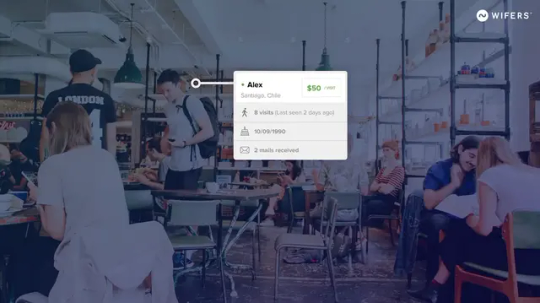
Initially, our focus was on generating a simple and affordable solution for small bistros to capture information from customers visiting their stores using Wi-Fi access points. In following iterations, we offered these businesses the opportunity to target and automate their customer communications, aiming to enhance customer engagement and retention. Finally, once we had a significant network of locations, we embarked on a data analysis challenge leveraging behavioral insights, customer preferences, recurrence, and walk-through metrics at the point of sale. We could even detect when a social media influencer walked in. By the beginning of 2020, our solution had been deployed in hundreds of stores across six countries in the region and our client base expanded to include pharmaceutical companies, multinational corporations and governments.
During that period, the industry underwent significant changes, including advancements in privacy and personal data protection regulations, updates in mobile operating systems and multiple devaluations of the Argentine peso. Ultimately, the pandemic forced us to stop our operations, interrupting an acquisition process with a US company that we had been negotiating with for over a year. Some of the operational and strategic decisions that left valuable lessons can be covered in another article. For now, I would like to share some insights on privacy in the information economy. The case of Wifers and other similar companies is relevant because it was enabled by three simultaneous phenomena: the privacy paradox, opacity vs. transparency and regulatory gaps.
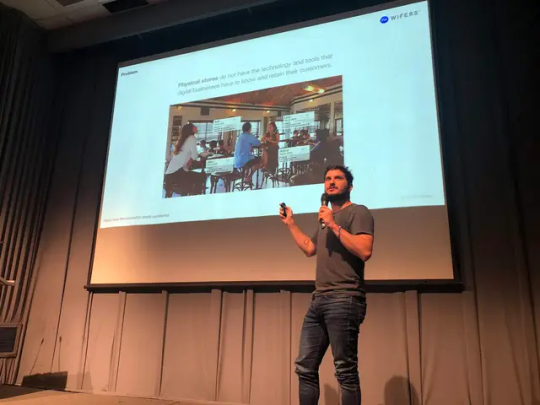
Presenting Wifers at Start-Up Chile G21 Demo Day (Santiago de Chile, 2019)
The Privacy Paradox
In his 1944 book “The Great Transformation”, Hungarian-American economist Karl Polanyi described the commoditization of essential elements of society that propelled the rise of industrial capitalism:
The idea of taking “human activity” outside the market, bringing it into the market, labeling it as labor and assigning it a price;
The idea of bringing elements of “nature” such as lakes, trees, and land into the market, calling it real estate and assigning it a price;
And the idea of “exchange”, which, subordinate to the market, has become the concept of money.
The great discovery of the 21st century is the notion that we can bring “human experiences” into the market, calling it data and then buy, sell, or create new markets for targeted advertising, personalization and profit generation. For several years now, data is the new commodity fueling the rise of surveillance capitalism, a new economic paradigm based on the intrusion into individuals’ privacy through digital technologies. The rapid and widespread adoption of these technologies and data collection practices have made it challenging for individuals to fully understand and control their privacy invasion. We can take the example of ‘Threads”, recently launched by Meta. How many users who were pulled from Instagram to this new app are aware of the amount of data it is collecting? How many are wondering why they really need all this information for an ordinary public messaging application?
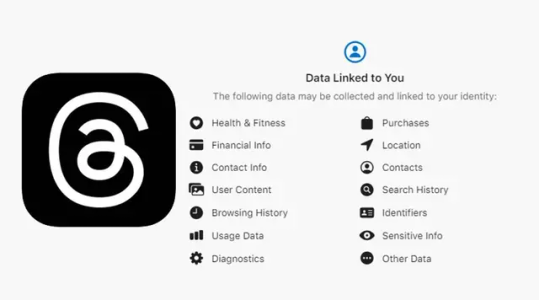
The data collected by the Threads app could include your sexual orientation, race and ethnicity, biometric data, trade union membership, pregnancy status, politics and religious beliefs.
Even acknowledging this, why individuals feel compelled to trade their personal data for access to certain products and services? The privacy paradox explains this disconnect between people’s concerns about privacy and their actual behaviors, attributed to several factors: asymmetry of power (individuals feel helpless or resigned against large corporations and believe their privacy is already compromised), convenience (people will overlook privacy concerns in exchange of benefits and personalized services), lack of awareness and understanding of data collection practices, social influence and norms (observing others willingly sharing personal information without negative consequences influence them to do the same) and timing (people prioritize immediate gratification over long-term privacy considerations when making decisions).
“The sharing of personal information might be perceived as a loss of psychological ownership that threatens individual’s emotional attachment to their data.”
Back in 1944, Polanyi argued that the unrestricted marketization of key commodities can have detrimental social and environmental consequences, contending that society must establish protective measures and institutions to counterbalance the potentially harmful effects of unregulated markets. In the information economy, understanding the privacy paradox is crucial for policymakers, organizations and individuals, and it highlights the urgent need for transparent data practices, user-friendly privacy policies and improved education regarding privacy risks.
Opacity vs. Transparency
Despite having fully capitalized on the privacy paradox, we always upheld ethical practices when it came to storing, managing, and being transparent with user data policies for those connecting to our systems. Throughout my period as the company’s director, no data was compromised, sold or transferred to third parties, either directly or indirectly. I firmly believed that if we were the ones processing the information, we should be the ones capable of monetising it in the most transparent and ethical way possible.
However, increased data volume meant more value for the company, driving the constant need to find new ways of extracting information from individuals through new sources and processing techniques. In order to achieve many of our functionalities, we needed to rapidly and seamlessly collect data on millions of people, and many of these data collection techniques operated opaquely, in the background. For instance, users were often unaware that we could detect their devices in stores, even when not connected to our Wi-Fi networks or when their devices were locked, despite it being stated in our terms and conditions.

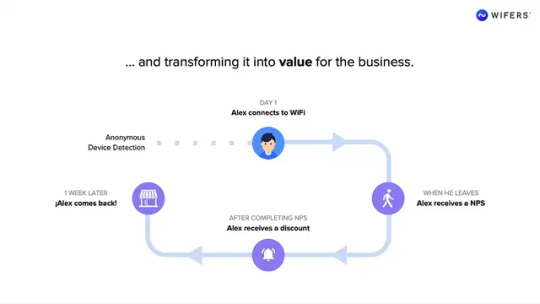
The dilemma of opacity and transparency is not new in the history of information systems but becomes particularly sensitive when a company’s existence is directly tied to the quantity and quality of the data it utilizes. Products like Threads and Wifers can take advantage of opacity to find new data collection opportunities because their business relies on it. Maintaining transparency policies requires significant effort. In the information economy, the pursuit of data as a commodity can blur ethical boundaries and lead companies to overlook this in order to maximize profits, potentially resulting in privacy violations, data misuse and other significant problems.
Regulatory Gaps
In a familiar pattern from previous experiences, we entered the market early. Not only did we secure our first sales before companies even realised they needed our technology, but we also operated silently for a significant period of time, employing a small organizational structure and employing seemingly invisible technology. This ability to remain unobserved provided us with a competitive advantage, but it was also facilitated by the context. These transactions existed in a regulatory vacuum, devoid of oversight, audits, or comprehensive protection measures.
Across the numerous locations and countries where we operated in Latin America, there existed (and still exists) no clear-cut regulatory framework that establishes the boundaries within which companies can collect and exploit personal data belonging to their customers. Our business model would have encountered very different challenges in the United States or Europe, where online privacy and personal data have been subject to legislation since 2016. Instead, we thrived for years in a green field facilitated by regulatory gaps.
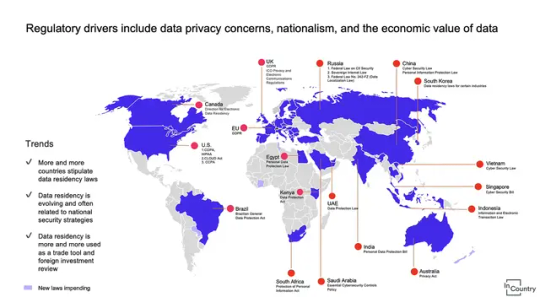
The progress made in data legislation worldwide in 2021 represents a significant milestone in the ongoing fight for internet freedom and individual protection (InCountry, 2021)
Fortunately, privacy regulations are evolving slowly but surely. Leading the way is the European Union with its robust General Data Protection Regulation (GDPR), setting a high standard for data protection and inspiring other jurisdictions to update or establish their own data privacy laws. In an environment where privacy concerns are growing, the evolving landscape of privacy regulations worldwide may signify a shift towards consumer protection.
The age of digital sovereignty
Companies like Wifers were possible a few years ago, but may not be viable today. It is no coincidence that Threads has not yet been launched in Europe. The resistance against surveillance capitalism, fueled by the dominance of digital advertising giants in the Web 2 era and signed by the Facebook-Cambridge Analytica scandal, has raised awareness and sparked a strong desire among consumers and developers to challenge and weaken the data aggregation practices of corporations and governments.
More educated and privacy-conscious consumers, developers creating more transparent alternatives and regulated environments are paving the way for a transformative shift in the digital landscape. As this new paradigm takes shape, a vision is emerging for the Web 3 as a decentralized future that respects privacy, protects autonomy, and challenges power distribution. Some of this alternatives could truly disrupt the dominance of major players and restore digital sovereignty to individuals. For example, promising technologies like Self-Sovereign Identity (SSI) or decentralized identity are offering new ways to protect personal data and reshape the landscape in technical, commercial, legal, and social dimensions.
The path ahead is long, but the destination is clear. Our personal information and experiences must belong to us once again, and the internet should fulfill its promise as a tool for connection and democratization.
0 notes
Text
1,108 men report domestic violence in six years – Lagos govt

The Lagos State Government through its Domestic and Sexual Violence Agency says 1,108 men have reported being domestically abused in six years.
The DSVA Executive Secretary, Titilola Vivour-Adeniyi, made this known on Thursday at the unveiling of ”The Hidden Crime, Violence Against Men” initiative at Ikeja.
Vivour-Adeniyi said the initiative was to encourage male folks to speak up, as they also experienced different kinds of violence.
She said that Governor Babajide Sanwo-Olu, in his inaugural speech on May 29, informed Lagos residents of the addition of ‘PLUS’ into the THEMES Agenda.
The ‘PLUS’, the DSVA scribe said, represented Social Inclusion, Gender Equality and Youth.
The News Agency of Nigeria reports that the acronym, T.H.E.M.E.S, represents the six pillars of the State’s strategic development agenda.
They are Traffic Management and Transportation, Health and Environment, Education and Technology, Making Lagos a 21st Century Economy, Entertainment and Tourism, as well as Security and Governance”.
According to the DSVA scribe, Sexual and Gender-Based Violence is one of the greatest hindrances to achieving gender equality.
”It is, therefore, for these reasons, that the agency deemed it expedient to conceptualise this project – The Hidden Crime, Violence against Men.
”We believe that this will be an opportunity to continue to break the culture of silence, which encourages SGBV to thrive. Indeed, men and boys can be victims of domestic and sexual violence.
”A detailed overview of the data recorded over the past six years, revealed that 1,108 men have reported incidents of domestic violence.
“This, however, does not include male children that have experienced one form of GBV or the other,” she said.
The executive secretary disclosed that the agency’s recently concluded community engagement in over 10 local government areas revealed that Lagos’ residents believed that there had been less enlightenment and spotlight on men who were SGBV victims or survivors.
“That research revealed that out of the 140 sex convicts, 80.5 per cent of them said they were sexually abused at an early age, some as young as 6 years old and as such were exposed to unhealthy sexual relationships.
”Majority of them did not receive psycho-social support and as such, they began abusing others, thereby revealing the abused-abuser trend.
”It is, therefore, important that the male folk are aware of this; there is no shame in their pain.
“It is also compelling to inform men of the different forms of violence and the support services that the state government has put in place to proactively address these issues.
”We also have a duty to engage men to realise that they play a most crucial role in the fight against Sexual and Gender-Based Violence,” she said.
Vivour-Adeniyi said the agency had a mission to ensure that no gender was left behind in its advocacy, preventive and response mechanisms.
She said that it already had an inclusive response team in the office and would in the course of the month, engage men in all aspects of the state.
The DSVA Community Engagement Officer, Tobi Ikudaisi said that in 2022, a total of 281 men came to the agency to report one form of violence or the other against them.
Ikudaisi said that a lot of men had not been bold enough to speak up, as they felt they might be ridiculed by society.
He, therefore, encouraged them to speak up against violence meted out on them, so that lives could be saved.
:
Read the full article
0 notes